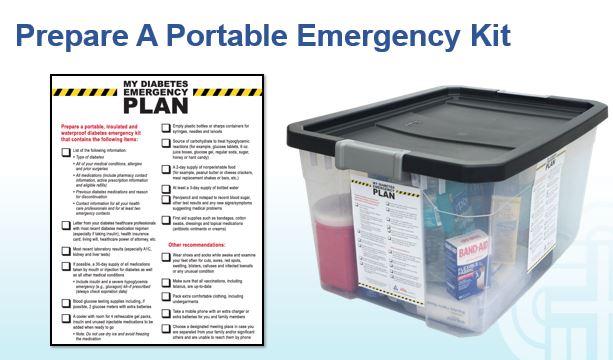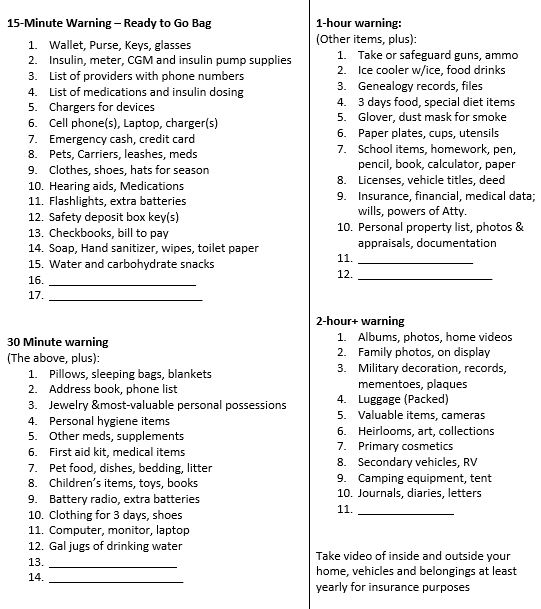
As we enter fire and storm season, it’s always a good idea to think ahead and be prepared for disaster. For people living with diabetes, a “diabetes kit” is an important part of emergency preparedness. We are excited to share a few getting ready checklists and resources that we think are really helpful.
For any emergency scenario, it’s important to have an emergency preparedness plan that includes a meeting point, an exit route, a “get-away” bag, and communication strategies. Identify and inform the people who will be included in the emergency plan ahead of time and make sure everyone clearly knows what to do and what action to take.
An easy way to get started is to download the Checklist and Plan created by the Diabetes Disaster Response Coalition. We have also created a Disaster Checklist Word document that you can download and customize for yourselves. These checklists can help you start the conversation and commit the details to paper.
Disaster can happen in a moments notice. It’s important to plan ahead and be ready, especially for people living with diabetes.
Here are a few helpful resources for ourselves and our community:
Resources for People with Diabetes
General information from the Diabetes Disaster Response Coalition (DDRC) on preparedness for people living with diabetes.
Have an Emergency Diabetes Plan and Kit Ready: DDRC’s Diabetes Plan and Kit checklist includes helpful steps to take in preparation for disaster. The checklist details needed supplies and information that should be written down and kept in a waterproof container for emergency situations where is can be found by a health care provider to make informed emergency treatment decisions.
Stay Updated: Visit Breakthrough Type 1 Disaster Relief Resources and Diabetes Disaster Response Coalition includes information on how to access medical support, shelters, and open pharmacies during times of disaster.
Individuals with diabetes who need help: Call 1-800-DIABETES (800-342-2383). The American Diabetes Association Center For Information is open, MON.-FRI. 9 a.m. TO 7 p.m. ET. Representatives are regularly updated with information on how to access medical support, shelters, pharmacies, and more.
American Red Cross Shelters: Contact the American Red Cross directly at 1-800-RED-CROSS.
Resource For Health Care Providers:
- Insulin Supply Hotline: During a disaster, call the emergency diabetes supply hotline 314-INSULIN (314-467-8546) if you know of diabetes supply shortages in your community (i.e. shelter, community center). The hotline is for health care providers only.
- Diabetes Disaster Response Coalition (DRRC). If a disaster hits, people with diabetes may need emergency supplies and help fast. Please visit the DRRC website if you are a diabetes health care provider and are requesting information about diabetes supplies during disasters.

In addition to the items listed below, make sure to pack hand sanitizer, wipes, and masks due to the current pandemic. Also, bring your own pillow and bedding in case you need to spend time in a shelter.
Download, Share, and Personalize this Emergency Checklist
Emergency Evacuation-Items to Gather for People with Diabetes
We thought this list was a helpful way to prioritize what items to grab given different time frame limitations. We found it online and customized it for people with diabetes. It is available in Word or PDF. Thank you for sharing with your colleagues and community.
- Emergency List that you can Customize in a Word Doc
- Emergency List as a PDF to print out

- Emergency List that you can Customize in a Word Doc
- Emergency List as a PDF to print out
1-800-DIABETES (800-342-2383) is an excellent referral resource for people with diabetes to call toll-free for updates on accessing medical support during an emergency.
Sign up for Diabetes Blog Bytes – we post one daily Blog Byte from Monday to Friday. And of course, Tuesday is our Question of the Week. It’s Informative and FREE! Sign up below!
The use of DES products does not guarantee the successful passage of the CDCES exam. CBDCE does not endorse any preparatory or review materials for the CDCES exam, except for those published by CBDCE.









